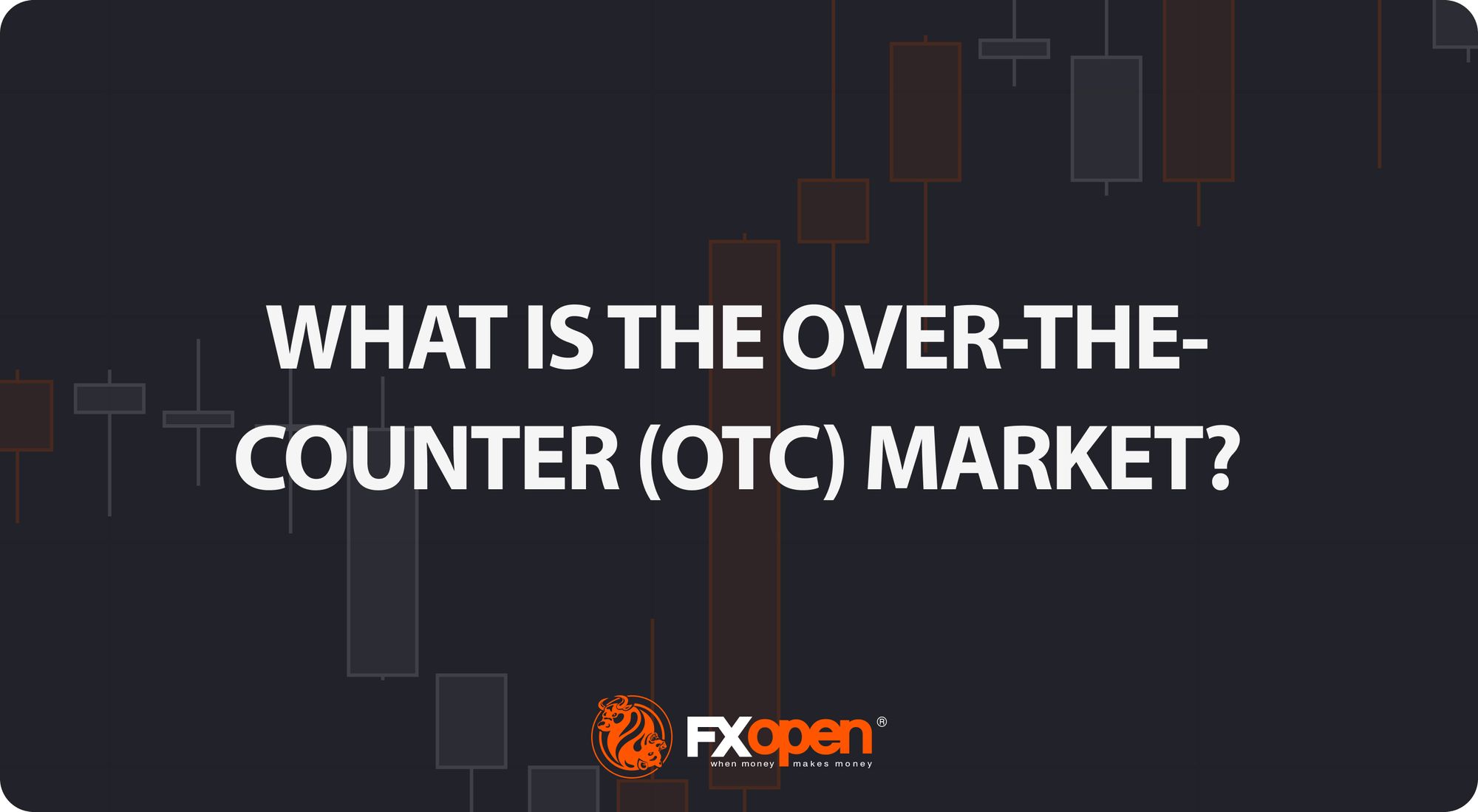FXOpen

The over-the-counter (OTC) market is a crucial yet often misunderstood part of the financial system. Unlike centralised exchanges, OTC markets offer a decentralised way to trade various securities, from bonds to currencies. This article explores how the OTC market works, its instruments, and the opportunities and risks it presents for traders and investors alike.
What Is the OTC Market?
The over-the-counter market meaning refers to the OTC marketplace, a decentralised network where financial assets are traded directly between buyers and sellers, rather than through a centralised exchange like the NYSE. This OTC definition highlights that trades happen via private negotiations, often facilitated by brokers or dealers.
OTC markets cover a wide range of assets, including bonds, derivatives, and unlisted stocks. This market is popular for assets that are either too niche or illiquid to be traded on traditional exchanges. For example, many corporate bonds and complex derivative products are commonly traded OTC.
One of the key features of the OTC market is its flexibility. Since it’s not bound by exchange rules, traders can customise contracts, including factors like trade size and terms. However, this also means less transparency, as there’s no central exchange to standardise prices. Investors also face greater counterparty risk—the risk that the other party in a trade may default. Prices can vary, and buyers often face wider bid-ask spreads due to lower liquidity.
Despite this, OTC market trading plays a crucial role in global finance, especially for institutions looking for bespoke solutions or access to less commonly traded assets. Although not as accessible to retail traders, it’s vital for institutional investors, corporations, and hedge funds.
How Does the Over-the-Counter Market Differ from Exchanges?
The over-the-counter market and traditional exchanges both facilitate the trading of securities, but they operate in fundamentally different ways. Check out how they differ:
1. Centralisation
- OTC: Decentralised, with trades occurring directly between two parties, typically via brokers or dealers, often through phone or electronic means.
- Exchanges: Centralised, with all trades happening in a formal, regulated environment (e.g., the NYSE), ensuring consistent pricing.
2. Regulation
- OTC: OTC trading is regulated but with fewer reporting requirements and more flexible trading terms.
- Exchanges: Highly regulated, with strict oversight from government bodies (e.g., SEC) to provide transparency and protect investors.
3. Pricing Transparency
- OTC: Prices are negotiated and can vary between trades. This lack of a central order book means there’s often less price visibility.
- Exchanges: Transparent pricing with public order books and visible trade histories, ensuring all market participants see the same prices.
4. Liquidity
- OTC: Liquidity can be lower, and bid-ask spreads can be wider, particularly for less frequently traded instruments.
- Exchanges: Typically higher liquidity with narrower spreads due to the larger pool of buyers and sellers.
5. Contract Standardisation
- OTC: Contracts can be customised to suit the needs of the parties involved, which is common with derivatives.
- Exchanges: Contracts are standardised in terms of size, quality, and other conditions, offering uniformity across trades.
6. Counterparty Risk
- OTC: Higher counterparty risk since there's no intermediary guaranteeing trades.
- Exchanges: The exchange itself acts as an intermediary, reducing the risk of default.
Different OTC Markets
The OTC market is decentralised, but it has several key venues or platforms where securities are traded. Each market offers a different level of access and regulation. Key over-the-counter market examples include:
OTCQX
This is the top-tier OTC market, where companies must meet higher financial and reporting standards. It’s known for featuring well-established companies, including international firms and large corporations that don’t wish to list on major exchanges but still want access to US investors.
OTCQB
Often called the "Venture Market," this tier caters to smaller or growing companies. It has less stringent requirements than OTCQX but still requires regular financial reporting and compliance with some SEC guidelines.
Pink Open Market
Also known as the "Pink Sheets," this is the most speculative and riskiest OTC market. Companies listed here have minimal financial requirements, making it home to smaller, more volatile firms. Investors should approach this arena with caution due to the higher risk of lack of transparency.
Forex, Bonds, and Commodities
Since OTC markets are decentralised, they are not as heavily regulated as exchange-traded markets. However, they are still subject to regulatory oversight in key jurisdictions to ensure transparency, protect participants, and prevent fraud.
Types of Instruments Traded on the OTC Market
The OTC market is home to a wide variety of financial instruments, many of which don’t fit neatly within the rigid structures of formal exchanges. These instruments are often more customised or involve companies that aren’t listed on major exchanges.
Derivatives
The OTC market is one of the primary venues for trading derivatives—an instrument based on the price movements of an underlying asset. OTC derivatives examples include CFDs, swaps, forwards, and options.
These contracts are often tailored to meet the specific risk management needs of the parties involved. For instance, interest rate swaps help companies hedge against changes in borrowing costs. The key difference between exchange-traded and OTC derivatives lies in standardisation: exchange-traded derivatives are standardised, while OTC derivatives are customised to suit specific requirements.
Unlisted Stocks
Shares of smaller companies that don’t meet the listing standards of major exchanges are traded OTC. These stocks can range from well-established foreign companies (through mechanisms like American Depositary Receipts) to speculative, early-stage firms.
Bonds
Government and corporate bonds are frequently traded over the counter. Since bonds are typically issued in large quantities and often have specific terms, the OTC market allows for more flexibility and customisation compared to exchanges. This also includes municipal bonds, which are important for financing public projects.
Commodities
Some commodities, such as gold or oil, can also be traded OTC, offering buyers and sellers a flexible way to arrange deals that aren’t subject to standardised exchange rules.
Currencies
The foreign exchange (forex) market, the largest OTC market globally, involves the trading of currency pairs. While it’s a specialised space, it’s essential for international trade and finance.
Want to explore a world of currency pairs and stock and commodity CFDs? Head over to the TickTrader trading platform by FXOpen to get started.
Advantages and Disadvantages of OTC Markets
The OTC market offers both significant advantages and notable disadvantages, making it an important but complex space for investors.
Advantages
- Flexibility: OTC markets allow for greater flexibility in terms of trade size, timing, and contract structure. This is particularly valuable for derivatives and bonds, where customised terms are often crucial for hedging or managing financial risks.
- Access to Niche Markets: Many securities traded OTC, like unlisted stocks or foreign bonds, aren’t available on major exchanges. This provides investors with access to a broader range of opportunities, particularly in niche or emerging markets.
- Less Stringent Requirements: For companies, the OTC market offers a way to raise capital without the heavy regulatory burden of a stock exchange listing. This makes it a viable option for smaller or newer companies looking to grow.
Disadvantages
- Lower Transparency: One of the biggest downsides of OTC trading is its lack of transparency. Prices are often not publicly available, making it harder for investors to gauge fair value.
- Higher Counterparty Risk: Since there is no centralised clearinghouse, the risk that one party might default on a trade is higher in OTC venues. This can be particularly risky in volatile conditions.
- Liquidity Issues: Liquidity can be much lower in OTC markets, especially for niche or less frequently traded securities. This means that finding a buyer or seller at the desired price may be more challenging, resulting in wider bid-ask spreads.
The Bottom Line
The OTC market offers unique opportunities for traders seeking flexibility and access to specialised securities. However, it comes with its own risks. Understanding these factors is key to navigating this dynamic marketplace. To potentially mitigate risks, traders choose regulated, well-established brokers with a long history.
To explore trading opportunities in the forex, stock, and commodity markets, consider opening an FXOpen account and gain access to four advanced trading platforms, blazing-fast execution speeds, and competitive trading costs.
FAQ
Is Forex an OTC Market?
Yes, forex is an over-the-counter (OTC) market. It operates through a global, decentralised network where currencies are traded directly between participants, rather than through a central exchange. Retail traders access this market via brokers, allowing them to trade currency pairs 24/5.
What Is OTC in the Stock Market?
In the stock market, the OTC meaning refers to trading securities outside of formal exchanges. These are often smaller companies that don’t meet the requirements for major exchanges like the NYSE and are traded via a broker-dealer network.
What Are Examples of OTC Financial Products?
Examples of OTC financial products include bonds, derivatives like swaps and options, unlisted stocks, and currencies. These products are traded directly between parties, often through brokers, without a central exchange.
What Is an Example of an OTC Platform?
An example of an OTC platform is OTC Markets Group, which facilitates the trading of unlisted stocks through tiers like OTCQX, OTCQB, and Pink Open Market.
What Is OTC in the Crypto Market*?
In the cryptocurrency market*, OTC trading involves large transactions of digital assets conducted directly between buyers and sellers, often through brokers, bypassing traditional exchanges for greater privacy and flexibility.
*At FXOpen UK, Cryptocurrency CFDs are only available for trading by those clients categorised as Professional clients under FCA Rules. They are not available for trading by Retail clients.
This article represents the opinion of the Companies operating under the FXOpen brand only. It is not to be construed as an offer, solicitation, or recommendation with respect to products and services provided by the Companies operating under the FXOpen brand, nor is it to be considered financial advice.
Stay ahead of the market!
Subscribe now to our mailing list and receive the latest market news and insights delivered directly to your inbox.








